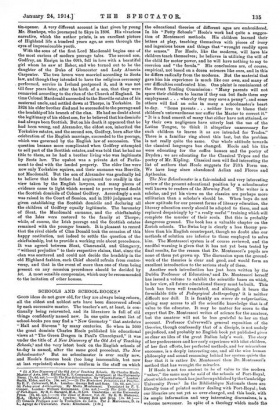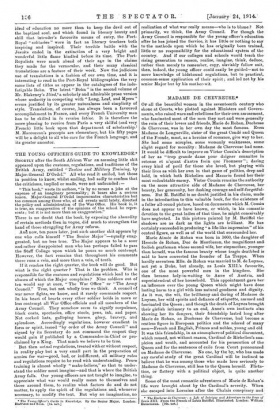SCHOOLS AND SCHOOL-BOOKS.*
GOOD ideas do not grow old, for they are always being reborn; all the oldest and noblest arts have been discovered afresh by each successive master. The teacher's art, at least, is con- tinually being reinvented, and its literature is full of old things confidently named new. In one quite ancient list of achool-books you may find a "New Geometry" that antedates "Hall and Stevens" by many centuries. So when in 1660 the great dominie Charles Hoole published his educational views at "The Green Dragon in Paul's Churchyard," it was under the title of A New Discovery of the Old Art of Teaching Sehoole,' and the very latest book on the English schools of to-day is named, after the same good precedent, The New Schoolmaster.' But no schoolmaster is ever really new, and bole's famous book (too long inaccessible, but now at last reprinted) shows how uniform is the stuff on which • (I) A Non Diecosery of the Old Art of Teaching School.. By Charles Mole, Master of Arta, 1660. Edited by E. T. Compagnae. Liverpool at the University Press. [7.6d. nat.1-7710 Noe Schoointastar. By "Fourth Form." London ) Smith. Elder, and Co. es. eat.]—(3) The Montessori Principles and Practice. By E. P. Culvert.% M.A. London George Bell and Sons. f3s. ad. set.)— (4) Pedaugical Anthropology. By Maria MontessorL Translated by P. T. Cooper. London William Heinemann. [Ids. ,,,t.1—(5) The Little Schools of Port-1101ml By H.C. Barnard, M.A., B.Litt. Cambridge at the tjujreeeity res. [7. 6d. net.]—(6) The Thad of Homer, Vol. IL By E. H. Blakeney, )LA. )Bohn's Libraries.) London George Bell and Sons. P. 6d.)— (7) Cough! Praliques pour to Nandi'', de Lath, Par J. Maromeau, D. is Agagd 55 l'Unlvereit4. Paris Elineksielr. [1 fr.]
the educational theories of different ages are embroidered. In his" Petty Schools" Hoole's work had quite a sugges- tion of Montessori methods. His children learned their letters at play, teaching themselves with pieces of ivory and ingenious boxes and things that" wrought readily upon the senses." For 'Toole, like the moderns, will have his children teach themselves; he believes in utilizing the will of the child for motor power, and be will have nothing to say to coercion and "the ferule." His conclusions are, of course, empirical, not based on a dozen sciences like ours, and in this he differs radically from the moderns. But the material that gave him his experience is much like our own, and many of our difficulties confronted him. One plaint is reminiscent of the Street Trading Commission : " Many parents will not spare their children to learns if they can but finde them any employment. . . whereby they may save a penny"; and some others will find an echo in many a schoolmaster's heart to.day. "Some parents . . . neither love to blame their children's tintowardnesse nor suffer the Master to correct it." "It is a fond conceit of many that either have not attained, or by their own negligence have utterly lost the use of the Latina Tongue, to think it altogether unnecessary for such children to learns it as are intended for Trades." There is a familiar ring about this last, but the problem is not really quite the same. Our whole attitude towards the classical languages has changed. Hoole and his like were educating for the coffee houses and the poetry of Dryden; we are educating for the Classical Tripos and the poetry of Mr. Kipling. Classical men will find interesting the list of authors that Hoole suggests for Fifth Form use. We have long since abandoned Aelian and Florus and Apthoniue.
The New Schoolmaster is a fairminded and very interesting review of the present educational position by a schoolmaster well known to readers of the Morning Post. The writer is a scholar, and yet his views on the classics are perhaps more utilitarian than a scholar's should be. When boys do not show aptitude for our present forms of literary education, the literary education surely should be adapted to them, and not replaced despairingly by "a really useful " training which will complete the murder of their souls. But this is probably dangerous ground. The book has a valuable chapter on the Zurich schools. The Swiss boy is clearly a less thorny pro- blem than his English counterpart, though no doubt also our methods of solution are inferior to those employed to solve him. The Montessori system is of course reviewed, and the needful warning is given that it has not yet been tested by final results, for the reason that Dr. Montessori's pupils are none of them yet grown up. The discussion upon the ground- work of the theories is clear and good, and would form an excellent introduction to the serious study of them.
Another such introduction has just been written by the Dublin Professor of Education? and Dr. Montessori herself has issued a volume to exhibit the scientific bases on which, in her view, all future educational theory must be built. This book has been well translated, and although it bears the formidable title of Pedagogical Anthropology.' it is neither difficult nor dull. It is frankly an (cum de vulgarisation, giving easy access to all the scientific knowledge that is of value to the educator. It may be matter for scorn to the expert that Dr. Montessori writes of science for the amateur, but the amateur will not be less grateful to her on that account. Professor Culverwell's general exposition of the theories, though confessedly that of a disciple, is not unduly prejudiced, and probably no English book yet published gives so clear an idea of the great Italian lady's work. The story of her predecessors and her early experience with idiot children, of her first efforts, her perfected methods, and her miraculous successes, is a deeply interesting one, and all the wise human philosophy and sound reasoning behind her system quiets the fear that it is rather Dr. Montessori than Dr. Montessori's method that has wrought the miracles.
If Hoole is not too ancient to be of value to the modern "usher," the same may be said of the schools of Port-Royal, about which a new book has just been published by the Cambridge University Press., In the Bibliotheque Nationale there are literally tons of printed matter dealing with Port-Royal; but our libraries are not yet so over-charged, and this book, with its ample information and very interesting discussions, is a welcome newcomer. In spite of a theology which made the ideal of education no more than to keep the devil out of the baptized soul, and which found in literary beauty and skill that intruder's favourite means of entry, the Tort- Royal " solitaries " were in fact as literary teachers both inspiring and inspired. Their terrible battle with the Jesuits ended in the extinction of a very bright and wonderful little flame kindled before its time. The Port- Royalists were much ahead of their age in the claims they made for the vernacular, and their many classical translations are a feature of their work. Now the judicious use of translations is a fashion of our own time, and it is interesting to read in the Port-Royal bibliographies the very same lists of titles as appear in the catalogues of the inde- fatigable Bohn. The latest" Bohn" is the second volume of Mr. Blakeney's Iliad, a scholarly and admirable prose version whose audacity in competing with "Lang, Leaf, and Myers" seems justified by its greater naturalness and simplicity of style. Translation, of courseJlas always been a favoured accomplishment in France, and every French University man has to be skilled in fa version 1 aline. It is therefore the snore pleasing to receive from Paris a very skilful (and very French) little book upon that depattment of scholarship:, M. Marouzeau's precepts are elementary, but his fifty pages will be a delight to all who care for the French language, and its greater ancestor.







































 Previous page
Previous page